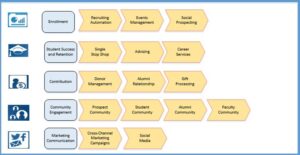Author Vishal Shukla
Intelligence Redefined: The Expanding Role of AI- Based Technologies in Higher Education
Picture this: You walk into your 9 AM lecture still half-asleep, and your phone buzzes with a friendly reminder from your AI assistant. It’s already queued up yesterday’s notes, spotted the concept you struggled with, and lined up a quick 5-minute video to clear it up before class starts. Meanwhile, your professor gets a quiet heads-up that three students—including you— might need extra help before midterms hit.
Sound like science fiction? It’s happening right now on campuses everywhere.
AI isn’t here to replace your professors or turn college into a robot assembly line. Instead, it’s becoming the ultimate partner for both students and educators—personalizing your learning journey, catching you before you fall behind, and freeing up professors to do what they do best: actually teach. From smarter admissions processes to research breakthroughs happening at lightning speed, AI is quietly revolutionizing how we learn, teach, and succeed in higher education. The real magic? It’s turning mountains of data into real support that actually helps you graduate.
1. Smarter Admissions: Personalization Begins Before Enrollment
AI is revolutionizing how universities attract, evaluate, and enroll students. Predictive models analyze applications to identify ideal candidates who align with institutional goals, while chatbots and virtual advisors provide real-time support for inquiries and financial aid.
This shift helps institutions deliver a personalized recruitment experience at scale, especially for digital-first Gen Z learners who expect instant, intuitive engagement.
For example, universities using AI-powered CRMs—such as Salesforce Education Cloud integrated with Einstein GPT—can tailor outreach messages based on interests, prior academic data, and engagement patterns. This not only boosts conversion rates but also ensures that students begin their academic journey with a sense of belonging and clarity
The diagram below depicts a student’s association with schools and how a student’s data profiling begins with their initial school engagement.

Diagram 1. Student Phase-wise Journey and Touchpoints
2. Intelligent Classrooms: Teaching Powered by AI
Within the classroom, AI-based learning management systems (LMS) are enabling a new generation of adaptive learning. Algorithms analyze participation, quiz performance, and behavioral data to personalize content and pacing. AI tutors and virtual labs provide on-demand assistance, giving every student access to tailored guidance.
Faculty benefit as well. Automated grading tools and natural language processing (NLP) systems free up valuable teaching time, allowing instructors to focus on mentoring and innovation. Institutions like Arizona State University and Georgia Tech have already demonstrated how AI assistants enhance both engagement and efficiency in large-scale learning environments.
3. Predictive Analytics: Early Warnings, Real Impact
AI-driven analytics are transforming student success initiatives. By analyzing patterns across attendance, performance, and engagement data, predictive systems can forecast which students may struggle and why.
Advisors can then intervene proactively—offering tutoring, counseling, or adjusted workloads—before minor challenges escalate into major setbacks.
An Ivy League institution’s internal study recently revealed that predictive AI tools improved retention rates by nearly 12% in pilot programs. These insights are particularly powerful in addressing equity gaps, as data helps surface support needs that might otherwise remain hidden.
4. Research, Ethics, and the Human Touch
AI-driven analytics are transforming student success initiatives. By analyzing patterns across attendance, performance, and engagement data, predictive systems can forecast which students may struggle and why.
Advisors can then intervene proactively—offering tutoring, counseling, or adjusted workloads—before minor challenges escalate into major setbacks.
An Ivy League institution’s internal study recently revealed that predictive AI tools improved retention rates by nearly 12% in pilot programs. These insights are particularly powerful in addressing equity gaps, as data helps surface support needs that might otherwise remain hidden.
5. The Road Ahead: Building an AI-Ready Campus
Within the classroom, AI-based learning management systems (LMS) are enabling a new generation of adaptive learning. Algorithms analyze participation, quiz performance, and behavioral data to personalize content and pacing. AI tutors and virtual labs provide on-demand assistance, giving every student access to tailored guidance.
Faculty benefit as well. Automated grading tools and natural language processing (NLP) systems free up valuable teaching time, allowing instructors to focus on mentoring and innovation. Institutions like Arizona State University and Georgia Tech have already demonstrated how AI assistants enhance both engagement and efficiency in large-scale learning environments.
Conclusion: Empowering the Future Through Intelligent Transformation
AI in higher education isn’t making campuses feel like tech companies—it’s actually making them more human.
We’re not heading toward a future of robot professors and algorithm-driven degrees. Instead, we’re building something better: universities that finally have the tools to see every student as an individual, not a statistic. When AI handles the heavy lifting—crunching data, spotting patterns, flagging concerns—educators get their superpower back: time to actually connect with students who need them most.
This isn’t just an upgrade to campus IT systems. It’s a complete rethinking of what’s possible. Imagine universities that anticipate your struggles before you hit a wall, learning experiences tailored to how you actually think, and support systems that catch you before you fall. The future of higher education won’t be defined by how smart our algorithms get—it’ll be defined by how well we use them to unlock human potential, strengthen real connections, and help every student succeed. That’s not artificial intelligence replacing humanity. That’s intelligence amplifying it.
Date: 21 Oct 2025
– Vishal Shukla | Author
Lead Product Architect, EdTech Innovation Expert & Strategic Collaborator with Harvard Business School (HBS), USA
Vishal is a product architect accelerating digital transformation in higher education with innovative EdTech solutions. He designs and manages comprehensive platforms for degree programs, continuous education, and executive education. Through his expertise in business analysis, engagement management, and solution design, Vishal helps institutions reimagine and expand their educational impact.


